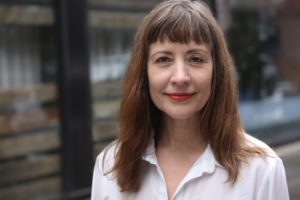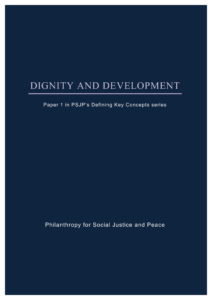 PSJP’s recently published paper on ‘Dignity and Development’ looks at the idea of ‘dignity’in development and philanthropy. The first point to be made is the need to recognize that development practitioners do not impart dignity to others. We do not ‘empower’ people – a word that carries a taint of colonialism in its definition of granting power to others. The PSJP paper also points out that the replication of colonial power structures and the ‘civilizing mission’ are practices in development that reduce dignity. We must recognize from the outset that the dignity of others is equal to our own. In practice, this means committing ourselves to the time it will take to build authentic relationships with the communities where we work. It means weathering all of the potential cultural misunderstandings and failings on both sides to create lasting trust. It means coming to the work with humility, an open mind and a big heart.
PSJP’s recently published paper on ‘Dignity and Development’ looks at the idea of ‘dignity’in development and philanthropy. The first point to be made is the need to recognize that development practitioners do not impart dignity to others. We do not ‘empower’ people – a word that carries a taint of colonialism in its definition of granting power to others. The PSJP paper also points out that the replication of colonial power structures and the ‘civilizing mission’ are practices in development that reduce dignity. We must recognize from the outset that the dignity of others is equal to our own. In practice, this means committing ourselves to the time it will take to build authentic relationships with the communities where we work. It means weathering all of the potential cultural misunderstandings and failings on both sides to create lasting trust. It means coming to the work with humility, an open mind and a big heart.
Climate Wise Women is nearly ten years old and I can honestly say that I have only begun to learn these lessons in the last few years as our work has turned from public advocacy on climate change to developing and supporting the communities most affected. The women in sub-Saharan African and the Pacific Islands with whom I work have been my greatest teachers.
Researcher Jonathan Glennie is quoted in the PSIP paper as saying that development with dignity requires ‘a different way of seeing the world’. I would argue that it also requires a different way of coming to the work. In every grassroots project or organization with which we interact, are we as development practitioners asking ourselves these questions: who holds the power? Who should hold the power? How do we collaborate with our local partners in programme design? Are our programmes and initiatives the result of a truly participatory assessment?
Without the kind of deep awareness these questions provoke, we may unwittingly undermine the dignity of those whom we are privileged to serve. The PSJP paper highlights the issue of enabling ‘agency’ as a practice that ensures dignity in development. It lays emphasis on the importance of doing things with the people we seek to serve rather than to them. This resonates strongly with our practice at Climate Wise Women. If we are not taking decisions collaboratively, with full transparency, suspicions and misunderstandings arise. Can we share with our partners how funds are used? Are we acting on an unconscious bias towards the input of outside experts over local wisdom? The goal of our work must be community ownership. Working backwards from this goal, our ‘design thinking’ on programme planning and implementation has to recognize our partners as equals in decision-making – from goal setting to budgeting to community inclusion.
As we build our programmes are we already planning for our own obsolescence? To accord true dignity to our partners, we must understand that they are the leaders who will carry the work forward, complete the projects and, based on their own successes, develop new ones. We leave our own egos at home.
As Climate Wise Women works toward a new collaborative project in East Africa with partners from Kenya, Uganda, South Africa and the US – a network of Women’s Climate Centers that is the result of a self-assessment by village women in Kenya – we are keenly aware of the need to place dignity at the front and centre of our work. The purpose of the Women’s Climate Centers is to support African women’s desire for peer-to-peer learning and access to information and training that expands their resilience – whether in the areas of climate smart agriculture, entrepreneurship or political influence. And further, to create a network that is African led and financially self-sustaining so that it will not be vulnerable to the changing priorities of international donors.
We are consciously examining the inherent power structures of affluent white women working with rural African women and striving to create a new way of working that defers to African leadership. Making common ground together, ensuring that we are all being heard and understood, fostering the kind of deep trust that occurs only through time and shared experience – these are the values of dignity that we are seeking to embody in our work.
One of our goals is to share what we learn through this process with other practitioners. We hope to develop a model that is instructive to others. I’m not sure if we will end up with something that looks like a matrix or some other type of empirical measurement. But I do believe that, in honestly recording both our failures and our successes in achieving full equality and dignity among all partners, the Women’s Climate Centers may provide one small step forward in our journey towards lasting social change.
Tracy Mann is project director for Climate Wise Women, activists for women’s leadership on climate change solutions.